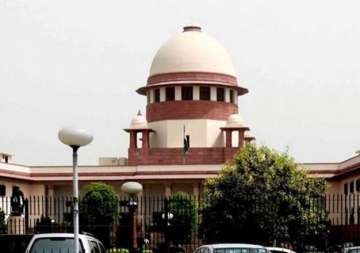SC raises queries on removal of eminent persons from NJAC
New Delhi: The Supreme Court today raised questions over the lack of provisions in the law for removal of two eminent persons from the six-member National Judicial Appointments Commission (NJAC) and sought to know whether

New Delhi: The Supreme Court today raised questions over the lack of provisions in the law for removal of two eminent persons from the six-member National Judicial Appointments Commission (NJAC) and sought to know whether there was any scope for judicial review of their selection.
“These eminent persons would be there for three years. How will you (Centre) remove them. Therefore, the selection of eminent persons in the commission has to be unquestionable process or there should be a process of removal,” a five-judge Constitution bench headed by Justice J S Khehar said while hearing petitions challenging the validity of the NJAC Act.
“Is there any scope of judicial review of the appointment of eminent persons in the NJAC? Suppose an eminent cricketer is appointed and somebody says that he is not so eminent to be in the panel, then what is the remedy,” it said.
The court's observation came minutes after Attorney General (AG) Mukul Rohatgi started advancing arguments on the manner of selection and the roles to be played by two eminent persons in the six-member NJAC.
The court took on Centre's plea that NJAC is a “broad-based” and “transparent” method to appoint judges by saying that if it refuses to appoint a person of “shady” character as a judge, then he may file a defamation case.
“Sometimes there is no proof that the person is of shady character,” the bench said, adding that subjecting judges' appointment to the RTI may lead to defamation for those rejected on “doubtful integrity”.
“Then scrap the RTI,” the AG said, adding, “there are pluses and minuses of a system. Such information can be protected under RTI also.”
“It is disastrous either way, if a lawyer, who applies, is appointed or rejected,” the bench said. Then somebody must suffer for the larger good, the AG said.
The Attorney General responded to the query on removal of eminent persons from the panel saying that the Parliament, in discharge of its functions, may make the “law or rules”.
Referring to provisions in the General Clauses Act, he said, “Whoever appoints a person, can remove him. In this case, the troika (the PM, CJI and Leader of Opposition) has the discretion. It should be left to its discretion.”
“All this is in the realm of academic discussion. It (NJAC) has not started working. Even rules have not been framed,” he said, adding that moreover, it is a nomination and not a ‘pucca' appointment and, hence, can be withdrawn.
“The removal cannot be so simple when the appointment is made under the Constitution. Here the term is fixed and the removal cannot like that,” the bench said. “Do you say that hire and fire rule can apply in the case of eminent persons,” it said.
Rohatgi responded by saying, “Nobody can say that the troika of the Prime Minister, the CJI and the Leader of Opposition will do some hanky-panky and the appointment of these two will be on the piece of paper. Nothing more. It is not the office of profit...”.
At the outset, he referred to the composition of the Constituent assembly where non-lawyers had participated and contributed in the framing of the Constitution and said “it is not as if, a person who has nothing to do with the law cannot contribute in the NJAC.”
Rohatgi said the eminent persons will represent the common public, the “ultimate consumer of justice”. The bench objected to it said, “don't call them consumer of justice. Call them seekers of justice”.
“The question is: Will the presence of two eminent persons vitiate the selection process so much that it will topple the pillars of the constitution itself,” Rohatgi said that persons like great film maker Satyajit Ray, Bill Gates and M S Swaminathan can contribute to judges' selection process.